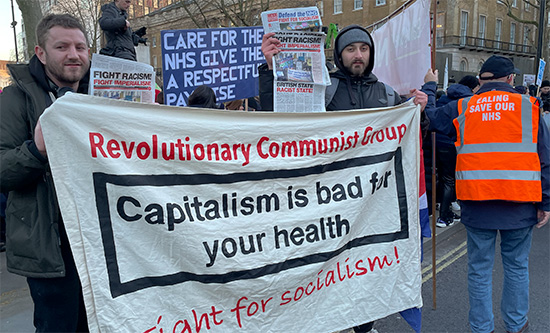Labour’s blame game
In November 2024, Labour Health Secretary Wes Streeting announced plans to ‘name and shame’ failing health trusts, warning that if the NHS did not improve it would not survive. He said hospital league tables would be introduced, with senior managers facing pay freezes and sacking unless they improved. Successful trusts, on the other hand, would have access to additional funding.
Far from addressing the crisis in the NHS, Labour intends to preside over its managed decline, while shunting blame for its failure onto the health service itself. Streeting’s comments came just as the Office of National Statistics had reported public service healthcare productivity had actually increased by 20.3% in the financial year ending 2022, despite inputs remaining essentially constant. But this is a health service running on empty. Streeting has made it clear that there will be no additional resources to sustain the efforts of an exhausted and increasingly demoralised NHS. His health adviser, Paul Corrigan, has explicitly said it is no longer possible to run the NHS as a ‘nationalised industry’. Most of the 3.6% increase in funding announced in the October Budget will be swallowed up by soaring day-to-day running costs and the desperate need to plug more than 111,000 unfilled posts. It will not address the 7.6 million people on waiting lists for planned treatment, more than 302,500 of whom have been waiting longer than 52 weeks. In these circumstances it is clear that Streeting’s plans will translate as trusts serving wealthier, healthier populations continuing to thrive while those in poorer areas are relentlessly punished for the failures of a crisis-ridden system in which the working class are getting sicker and dying younger.
Health and sickness report
‘Social inequalities in health arise because of inequalities in the conditions of daily life and the fundamental drivers that give rise to them: inequities in power, money and resources. These social and economic inequalities underpin the determinants of health.’ (Marmot Report Fair society, healthy lives, 2010)
In Britain, 375 million work days are lost every year due to long-term sickness. One third of working adults have at least one health condition. Four million people in Britain between the ages of 16 and 64 are currently off work because of ill health, with a further 300,000 a year joining their ranks. Life expectancy for men and women has fallen, as has the proportion of life lived in good health. The increasing ill-health of the working age population is a real problem for the ruling class, impacting as it does on growth and productivity, as well as – from its point of view – wasting NHS time and resources. A document produced in September 2024, by the NHS Confederation and the Boston Consulting Group’s Centre for Growth, called Improving our Nation’s Health: A Whole-of-Government Approach to Tackling the Causes of Long-Term Sickness and Economic Inactivity, seeks to offer solutions to this problem in order to ‘get Britain working’ – ie on behalf of capitalism. Long-term sickness, it says, accounts for the largest share of economic inactivity in the country. Reintegration and prevention would save on health spending, bring in up to £3bn in tax receipts and save the government money on benefits. Yet – despite reading like something written by ChatGPT and peppered with management-speak buzzwords – it also exposes how grim life is on every level for increasing sections of the working class.
The report shows that people in Britain are sicker than those in other European countries – showing that this is not a pan-European post-pandemic issue. Rather, quoting the Marmot Review, it shows the complex interplay of ‘non-healthcare factors’ influencing health outcomes – including homelessness, poor living conditions and poverty, all of which are increasing. It shows how social factors mean a working class person suffering an initially treatable health condition can end up with a host of co-morbidities, increasing deprivation and poor quality of life.
As the British Medical Journal has pointed out (April 2024) life expectancy and healthy life expectancy are closely linked to deprivation: the greater the deprivation, the shorter the life expectancy. Those living in deprived areas spend more of their shorter lives in poor health, while each increase in socioeconomic level results in an increase in health and lower mortality rate. So in a situation where over a quarter of all adults and a third of children in Britain are living in poverty and increasing numbers live in damp, unhealthy, overcrowded conditions; where transport to health centres or libraries to use internet facilities is unaffordable for many; where cash-strapped councils are cutting more and more essential services and where working age benefits are among the lowest in Europe, it is inevitable that levels of sickness, long-term disability, chronic pain and mental illnesses are on the rise.
The report pays lip-service to this, but ultimately its solutions are pie-in-the-sky. A ‘whole government approach’ of ‘joined-up funding’, more generous and less punitive benefit systems, better digital skills training, better information for a healthy diet and lifestyle… The Labour government has made it clear none of this is on the agenda. People will be forced into work, however unwell they are, as its recent announcement about withdrawing benefits from 18-21 year olds who refuse a job has shown. It will not scrap the main drivers of poverty – the two-child benefit rule and the overall benefit cap. It will clamp down on access to sickness and disability benefits. It will do nothing to improve health outcomes for the poor. For the working class, the fight for decent health is inextricably bound up with the fight against a capitalist system that reduces human life to economic units. It is a fight for our lives.
Hannah Caller
FIGHT RACISM! FIGHT IMPERIALISM! 303 December 2024 /January 2025




